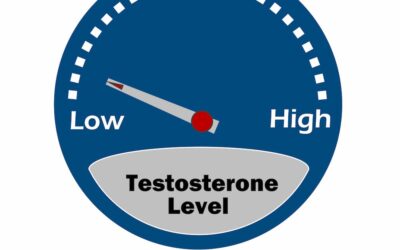How to Boost Testosterone Fast?
If you’re concerned about your testosterone level, you’re not alone! As men age, our bodies naturally slow down testosterone production. This can negatively impact your health and quality of life.
However, you can easily boost your testosterone level naturally! Let’s take a look at what you can do today.
What is Testosterone?
Testosterone is a male sex hormone. It plays an important role in sexual development in men. Testosterone levels are highest during puberty when secondary sexual characteristics begin to develop. Testosterone causes growth spurts, the development of facial and pubic hair, increases in muscle mass, and an increase in sexual drive.
After puberty, testosterone is produced in high concentrations in adult men. Testosterone continues to support muscle development and male fertility. Testosterone is also responsible for overall health and well-being.
Why Is Testosterone So Important in Everyday Life?
Testosterone is important for adults because it supports sexual health, muscle growth, and bone density. Testosterone is also involved in the production of sperm cells and male fertility. The production of red blood cells also requires testosterone.
Testosterone is related to another sex hormone, estradiol. In fact, testosterone can be converted to estradiol. Together, these two hormones are responsible for additional health benefits. Testosterone and estradiol play an important role in initiating and sustaining erections. They also work together to balance overall fat distribution.
Symptoms of Low Testosterone in Men
Low testosterone, also called Low-T, is a fairly common condition in men. As we age, our bodies naturally produce less testosterone. This process starts as early as age 30; however, most men won’t notice any symptoms of Low-T until their 40’s. Low-T can also be caused by environmental factors, such as damaged or infected testicles, toxic side effects of chemotherapy and other medications, and substance use disorders.
Because testosterone has wide-ranging benefits when produced in normal quantities, the symptoms of Low-T can impair your quality of life. Your sexual health can be negatively affected. You may develop erectile dysfunction or have a low sperm count. You might have a decreased sexual drive.
Other symptoms of Low-T include reduced muscle mass and an increase in body fat. Low-T can also cause mood disorders, such as irritability and depression. Men with Low-T report feeling fatigued or lacking energy.
Any of these symptoms could be a sign of Low-T. It’s important to discuss any health issues with your doctor to receive a proper diagnosis. If you do have Low-T, don’t worry! Safe and effective treatment can help you feel like yourself again. Contact us for a consultation to see if testosterone replacement therapy is right for you.
There are also effective ways to boost testosterone naturally by addressing dietary and lifestyle choices. Let’s take a look at some of these now and see how you can help restore your testosterone levels.
How You Can Improve Your Testosterone Levels Fast
Increasing your testosterone levels quickly isn’t difficult if you know what you’re doing. In fact, it can be as simple as improving your overall health: Improving your diet, exercising regularly, and getting enough sleep can contribute to a more normal testosterone level. Managing stress appropriately is also important for stimulating testosterone production.
Change Your Diet
Diet is very important for boosting your testosterone levels. Healthful foods can actually help to increase your testosterone levels, while unhealthy foods will lower your testosterone levels.
Scientists have studied the effects of diet on testosterone extensively. They’ve discovered that whole foods and home-cooked meals contribute greatly to increases in testosterone. On the other hand, processed foods and restaurant meals decrease testosterone levels.
There are also specific foods that can increase and decrease testosterone. For example, keeping to a keto diet can improve testosterone. In fact, most meats and fish tend to increase testosterone levels. There is an exception: unprocessed meat improves testosterone while processed meats have little or no impact on testosterone production in men.
Other unprocessed proteins are also beneficial, with the exception of soy. In one clinical study, doctors examined the testosterone levels of men eating meat with those of men eating soy proteins. The men eating soy had lower testosterone levels. This doesn’t mean you should avoid soy products altogether, but you should try to limit your intake of soy if you’re worried about Low-T.
Diets high in fat can be either really good or really bad for your testosterone levels. Remember, keto diets, which are typically high in fat, increase testosterone production. However, processed foods, many of which are high in fat, reduce testosterone. This distinction underscores the importance of unprocessed foods. Healthy fats can improve testosterone. Unhealthy fats can reduce testosterone.
The overarching lesson from all the scientific studies is this: Eat a healthy diet! It’s simple really; we all know what healthy eating looks like, but sometimes we get lazy. If you’re worried about Low-T, you should definitely make an effort to improve your diet. It will pay off!
Exercise
Exercise is also very important for maintaining healthy testosterone levels. Regular exercise can improve your overall health in many ways, including boosting your testosterone level.
One important clinical study showed a relationship between obesity and lowered testosterone levels. This is very important because it means simply getting in better shape can improve your testosterone levels. Exercise, combined with a healthy diet, is the best way to manage your weight.
It’s also important to note that decreased testosterone can actually contribute to weight gain. This may seem like a catch-22: decreased testosterone leads to weight gain, which further reduces testosterone. However, it also allows you to gain momentum if you want to improve your health. Once you start exercising and dieting, your testosterone levels will increase; as your testosterone increases, your body will build muscle more quickly and burn fat more easily.
Furthermore, testosterone replacement therapy can help you break the negative cycle. By boosting your testosterone, you can jump-start your body’s metabolism, making it easier to stay in shape. In turn, this will keep your testosterone levels up.
Improve Your Sleep
Sleep in incredibly important for overall health. Proper sleep reduces your risk of many diseases, helps you manage your weight, and keeps your brain in peak condition. And, yes, you guessed it – adequate sleep is crucial to maintaining healthy testosterone levels.
Scientists have made some interesting discoveries about sleep and its relationship to testosterone concentrations in men. Men who had difficulties getting enough sleep showed lower levels of testosterone. The decrease in testosterone will eventually correct itself when you return to a normal sleep pattern. However, this correction takes time, and it takes much longer as we age.
Another study found that men who experience sleep restriction for a shorter period of time don’t show decreased testosterone levels. However, when men consistently sleep less than 8 hours each night, their testosterone levels drop. This implies that a single restless night or two shouldn’t affect your testosterone levels; instead, it is chronic sleep loss that significantly affects your body’s ability to produce testosterone.
These two studies are important to consider when evaluating any potential symptoms of Low-T. You should strive to improve your sleep habits. Recommendations for improving sleep include keeping a consistent bedtime, limiting screen time before bed, and avoiding caffeine before bed. Establishing healthy sleep habits can help you consistently get plenty of high-quality sleep each night.
Like diet, it’s important to maintain healthy sleep patterns throughout life. Without adequate sleep, testosterone levels can decrease. As testosterone decreases, sleep quality and time can be negatively impacted, which could compound both problems. Sticking to healthy sleep habits can help to reduce any age-related testosterone decrease.
Herbs, Vitamins, and Supplements
In addition, several vitamins contribute to healthy testosterone levels in men. Nutritionists recommend that you get plenty of vitamins through your diet. Most doctors shy away from recommending vitamins unless you don’t get enough vitamins through diet. However, if you think you have a deficiency in any essential vitamins or minerals, supplements can be helpful.
Zinc is an important mineral that contributes to health in many ways. It supports healthy skin and a strong immune system. Zinc is also necessary for testosterone production. Zinc is included in many multivitamins, but it’s better to eat a diet high in zinc. Some foods that contain high quantities of zinc include shellfish, seeds, nuts, and legumes.
Vitamin E is also necessary for healthy levels of testosterone. Aside from multivitamins, you can find zinc in leafy greens, vegetable oils, and nuts among other foods.
Another vitamin to consider is vitamin C. Vitamin C is most known for boosting immune health, but it also plays an important role in many other aspects of health, including testosterone production in men. Eating more citrus fruits, bell peppers, and broccoli can help increase your testosterone production.
Finally, fish oil supplements have been shown to boost testosterone in men. Again, these can be helpful if you don’t eat much fish. Scientists have found little to no benefit from fish oil supplements for people who eat plenty of fish.
Of course, there are other nutrients that can improve testosterone levels. You should strive to eat plenty of vitamins and minerals in your regular diet. When it comes to testosterone, your body needs to be healthy.
The Bottom Line
We’ve looked at many factors that affect testosterone levels in men. All of these relate to overall health and wellness. Diet. Exercise. Sleep. Even stress. Maintaining a healthy lifestyle is incredibly important for our bodies to be able to produce testosterone consistently.
Really, improving your testosterone levels naturally looks no different than making healthier choices. There is no magic diet that improves testosterone. Rather, eating healthy in general will boost your testosterone. Likewise, exercise is important for testosterone production. Exercise is also important for staying healthy in general. Finally, keeping good sleep habits will improve your testosterone. It will also make you feel better and improve your overall health.
The bottom line is this: healthy choices improve testosterone. Unhealthy choices decrease testosterone. Here’s a quick breakdown of how to make healthier choices that can boost your testosterone levels:
- Choose unprocessed foods over processed foods
- Cook and eat at home instead of eating out
- Exercise regularly and maintain a healthy weight
- Practice better sleep hygiene and ensure you get plenty of good-quality sleep
- Manage any life stressors and see a psychotherapist, if necessary
- Take vitamins and nutritional supplements only if certain nutrients are missing from your diet
Testosterone Replacement Therapy
Testosterone replacement therapy is another way to boost your testosterone. This is important for any man to consider. As we’ve already discussed, our testosterone levels naturally decline as we age. Even if you maintain excellent health and physical fitness, your body will eventually slow down testosterone production.
Testosterone replacement therapy can help you boost your testosterone. Testosterone replacement aims to supplement your body’s natural testosterone production. A medical doctor can examine you to determine whether or not you have Low-T and will benefit from testosterone replacement.
The administration of testosterone can reverse many of the symptoms of Low-T. Your sex drive may increase; you may lose some belly fat; you may be able to increase your muscle mass more easily; you can enjoy better sleep and more energy; your bone density may increase.
What’s great about testosterone therapy is that many of these benefits will actually boost your body’s natural testosterone production. This doesn’t mean you will only need testosterone replacement once or twice; rather, it means testosterone therapy can help you improve your health and stay healthy.
When administered properly, testosterone replacement therapy is a safe and effective way to treat Low-T. At Ehormones MD, our trained medical staff can evaluate you and determine if testosterone therapy is right for you. Contact us today to schedule a consultation and see how we can help you!





